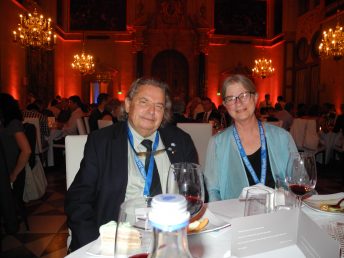Deaths: Wolfgang-Martin Boerner
Wolfgang-Martin Boerner, professor emeritus of electrical and computer engineering, died May 25. He was 80.
He was an eminent researcher in electromagnetics, especially in remote sensing and polarimetric imaging radar. Boerner had a distinguished record of accomplishments and recognition, and was a Life Fellow of IEEE, Optical Society of America, International Society for Optical and Photogrammetric Engineering, Society for Exploration Geophysics, SPIE, American Association for the Advancement of Science, and Institute of Electronics, Information and Communication Engineers.
He also was a member of the Russian Academy of Transportation Sciences, and served on the editorial boards for International Remote Sensing Society, SPIE Proceedings on Sensing and Imaging, International Series and Monographs on Advanced EM Wave Theory Applications, and the International Institute of Physics.
For his contributions toward linking international research centers of Oceania and East/Austral-Asia via the Americas with Eurasia and Europe, Boerner was honored with the distinguished IEEE-GRSS Outstanding Services Award and the IECE-SANE. He was awarded the Alexander von Humboldt U.S. Senior Scientist, the Japan Society for the Promotion of Science Senior U.S. Scientist, and the U.S. Navy Distinguished Senior Professor awards.
“It was my honor to have gotten to know him well,” said Rashid Ansari, head of electrical and computer engineering. “We would often meet in my office, where he shared his wisdom and many stories. He always impressed me with his boundless enthusiasm, optimism, and energy.”
Boerner was born in 1937 in Finschhafen, Papua New Guinea. He received a bachelor’s degree from Ansbach-Bayern in 1958, and a master’s in electrical engineering (Dipl. Ing.) from Technical University, München, in 1963, both in Germany. He earned his Ph.D. in electrical engineering from the University of Pennsylvania, Philadelphia, in 1967.
In 1978, he joined UIC as professor and director of the Communications, Sensing and Imaging and Navigation Laboratory, and rose to professor emeritus.
“I am saddened to hear of our colleague Wolfgang’s passing,” said James Lin, professor emeritus of electrical and computer engineering. “I have known Wolfgang for about 40 years; he was always enthusiastic regarding his research and UIC. On many occasions. I had given lectures for him while he made scientific travels to different parts of the world. He was always gracious.”
“For many years, decades in fact, Wolfgang Boerner occupied the lab next to mine,” said Jon A. Solworth, associate professor of computer science. “He was a remarkable man, and I’m greatly saddened to hear of our loss. Wolfgang was always fighting the good fight, and was widely respected and active in his work on sensing. I would always see him, even deep into his retirement, either coming from or going on another international trip, often for environmental studies. He will be greatly missed.”
Boerner’s research interests were in the areas of electromagnetic field theory and wave propagation (ELF to microwave, mm-waves, infrared, optical, ultraviolet, x-ray); direct/inverse scattering; radar target mapping and microwave imaging and remote sensing; lidar/radar target phenomenology; radar polarimetry and target polarization analyses; fourier optics and holography; acoustic and electro-magnetic wave propagation in anisotropic, inhomogeneous media, tomography and modern image processing; geoelectromagnetic profile inversion; and atmospheric optics non-linear problems in electromagnetic propagation; polarimetry in nature.
“Since he came to UIC in 1978, Wolfgang and I became and have been very good friends,” said Roland Priemer, associate professor emeritus of electrical and computer engineering. “It was fun to hear about his travels all over the world, which he enjoyed to do very much. His concerns about the migration paths of birds was especially interesting to hear about. He was a strong advocate of using the land north of Chicago, formally Fort Sheridan, as a bird sanctuary. It was awesome to hear about all the different kinds of surface and below surface phenomena that Wolfgang researched with his methods of remote radar sensing.”
Boerner was highly honored as a scientist. In 2012, he was recognized at 50th anniversary of IEEE Geoscience and Remote Sensing Symposium in Munich, Germany. He received a certificate for his “extraordinary technical contributions to the advancement of radar remote sending science.” Additionally, two special sessions were organized in honor of his birthday, “Recent Advancements in POLSAR Imaging in Honor of Professor Boerner’s 75th Birthday.”
“He was a bundle of energy, passionate about his work. He scared the daylights out of me as a young assistant professor,” said Thomas Moher, associate professor of computer science. “But I came to know him as a kind and thoughtful man, and I will miss the smile that came easily to his face and the twinkle that was always in his eye. The college has lost one of its founding giants.”

